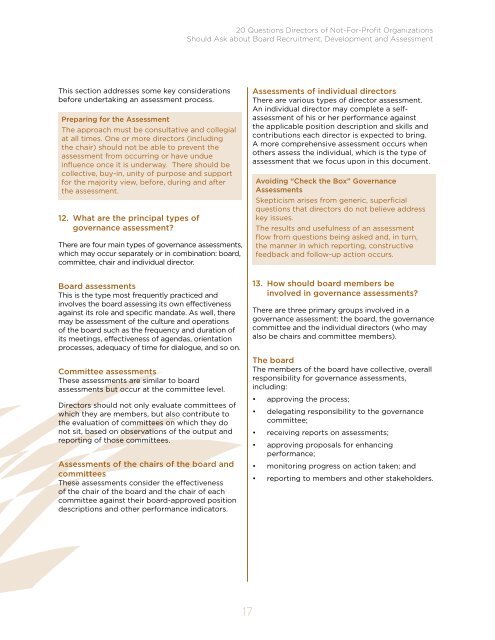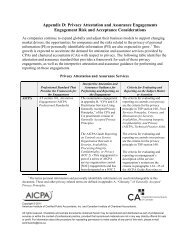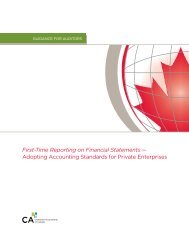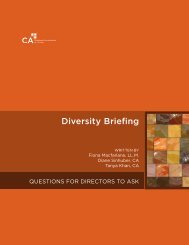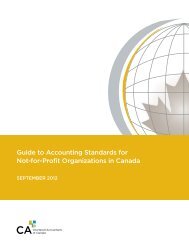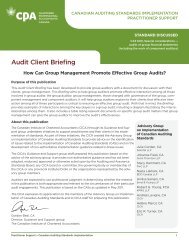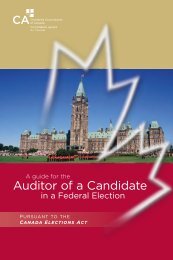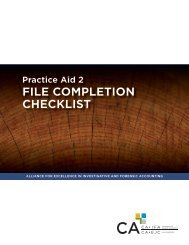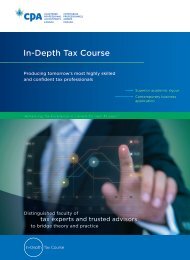20 Questions Directors of Not-for-Profit Organizations Should Ask ...
20 Questions Directors of Not-for-Profit Organizations Should Ask ...
20 Questions Directors of Not-for-Profit Organizations Should Ask ...
You also want an ePaper? Increase the reach of your titles
YUMPU automatically turns print PDFs into web optimized ePapers that Google loves.
<strong>20</strong> <strong>Questions</strong> <strong>Directors</strong> <strong>of</strong> <strong>Not</strong>-For-Pr<strong>of</strong>it <strong>Organizations</strong><br />
<strong>Should</strong> <strong>Ask</strong> about Board Recruitment, Development and Assessment<br />
This section addresses some key considerations<br />
be<strong>for</strong>e undertaking an assessment process.<br />
Preparing <strong>for</strong> the Assessment<br />
The approach must be consultative and collegial<br />
at all times. One or more directors (including<br />
the chair) should not be able to prevent the<br />
assessment from occurring or have undue<br />
influence once it is underway. There should be<br />
collective, buy-in, unity <strong>of</strong> purpose and support<br />
<strong>for</strong> the majority view, be<strong>for</strong>e, during and after<br />
the assessment.<br />
12. What are the principal types <strong>of</strong><br />
governance assessment<br />
There are four main types <strong>of</strong> governance assessments,<br />
which may occur separately or in combination: board,<br />
committee, chair and individual director.<br />
Board assessments<br />
This is the type most frequently practiced and<br />
involves the board assessing its own effectiveness<br />
against its role and specific mandate. As well, there<br />
may be assessment <strong>of</strong> the culture and operations<br />
<strong>of</strong> the board such as the frequency and duration <strong>of</strong><br />
its meetings, effectiveness <strong>of</strong> agendas, orientation<br />
processes, adequacy <strong>of</strong> time <strong>for</strong> dialogue, and so on.<br />
Committee assessments<br />
These assessments are similar to board<br />
assessments but occur at the committee level.<br />
<strong>Directors</strong> should not only evaluate committees <strong>of</strong><br />
which they are members, but also contribute to<br />
the evaluation <strong>of</strong> committees on which they do<br />
not sit, based on observations <strong>of</strong> the output and<br />
reporting <strong>of</strong> those committees.<br />
Assessments <strong>of</strong> the chairs <strong>of</strong> the board and<br />
committees<br />
These assessments consider the effectiveness<br />
<strong>of</strong> the chair <strong>of</strong> the board and the chair <strong>of</strong> each<br />
committee against their board-approved position<br />
descriptions and other per<strong>for</strong>mance indicators.<br />
Assessments <strong>of</strong> individual directors<br />
There are various types <strong>of</strong> director assessment.<br />
An individual director may complete a selfassessment<br />
<strong>of</strong> his or her per<strong>for</strong>mance against<br />
the applicable position description and skills and<br />
contributions each director is expected to bring.<br />
A more comprehensive assessment occurs when<br />
others assess the individual, which is the type <strong>of</strong><br />
assessment that we focus upon in this document.<br />
Avoiding “Check the Box” Governance<br />
Assessments<br />
Skepticism arises from generic, superficial<br />
questions that directors do not believe address<br />
key issues.<br />
The results and usefulness <strong>of</strong> an assessment<br />
flow from questions being asked and, in turn,<br />
the manner in which reporting, constructive<br />
feedback and follow-up action occurs.<br />
13. How should board members be<br />
involved in governance assessments<br />
There are three primary groups involved in a<br />
governance assessment: the board, the governance<br />
committee and the individual directors (who may<br />
also be chairs and committee members).<br />
The board<br />
The members <strong>of</strong> the board have collective, overall<br />
responsibility <strong>for</strong> governance assessments,<br />
including:<br />
• approving the process;<br />
• delegating responsibility to the governance<br />
committee;<br />
• receiving reports on assessments;<br />
• approving proposals <strong>for</strong> enhancing<br />
per<strong>for</strong>mance;<br />
• monitoring progress on action taken; and<br />
• reporting to members and other stakeholders.<br />
17


